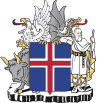Iceland–Palestine relations
 | |
Iceland |
Palestine |
|---|---|
Iceland–Palestine relations refers to the relations between Iceland and Palestine. Iceland was the first Nordic country to recognise the independence of Palestine. Full diplomatic relations exist between the two sides. Iceland's representative to Palestine is a non-resident based at the Ministry for Foreign Affairs in Reykjavík,[1] while Palestine's ambassador to Iceland is also a non-resident based in Oslo, Norway.[2]
Background
Iceland has had the NGO The Iceland-Palestine Association (Félagið Ísland-Palestína) since 1987. According to its website, the association "supports the Palestinian struggle against occupation and refugees' right of return". On May 18, 1989, the Icelandic parliament resolved to endorse the Association's major goals, including both Israel's right to existence and the claim of Palestinians to nationhood.[3]
Prominent Palestinians in Iceland and Icelanders of Palestinian heritage include:
- Salmann Tamimi, the head of the Icelandic Muslim Association, who came to Iceland in 1971.[4]
- Salmann's sister[5] Amal Tamimi, 'a Palestinian who came to Iceland in 1995 as a stateless person', who is the second foreign-born person (and the first foreign-born woman) to sit in the Icelandic parliament (a substitute for Lúdvík Geirsson in 2011 and for Katrín Júlíusdóttir in 2012).[6]
- Amal's daughter Falasteen Abu Lidbeh, who in 2008 became the first immigrant elected to Reykjavík City Council.[7]
- The poet Mazen Maarouf, who came to Iceland in 2011 through the International Cities of Refuge Network and in 2013 was offered Icelandic citizenship; much of his work has been translated into Icelandic.[8]
In 2008, Iceland received 29 Palestinian refugees from the refugee camp at Al-Waleed in Iraq; their experiences were chronicled in particular by Sigríður Víðis Jónsdóttir.[9] The arrival prompted negative reactions from a few Icelandic politicians, which Bergljót Soffía Kristjánsdóttir has interpreted as an example of rising xenophobia in Iceland.[10]
Recognition
On 29 November 2011, the
Reykjavík City Council attempt to Boycott Israeli goods
On 15 September 2015, Reykjavík City Council voted to boycott Israeli goods in municipal purchasing, in response to a motion tabled by Björk Vilhelmsdóttir. At the time of the vote, it was not yet clear whether the policy could successfully be implemented in terms of Icelandic law.[14] The move provoked swift and at times vitriolic criticism from supporters of Israel's handling of the Palestinian question, and on September 23 an extraordinary Reykjavík City Council meeting was called to withdraw the proposal. The withdrawal was approved unanimously at the Mayor's request.[15] The government of Iceland had immediately distanced itself from the motion, and Prime Minister Sigmundur Davíð Gunnlaugsson called it "ridiculous".
See also
References
- ^ Ministry for Foreign Affairs of Iceland. "Afhending trúnaðarbréfs í Palestínu". Ministry for Foreign Affairs of Iceland. Retrieved 21 November 2012.
- ^ Ministry for Foreign Affairs of Iceland. "Diplomatic and consular list" (PDF). Ministry for Foreign Affairs of Iceland. Retrieved 21 November 2012.
- ^ "Palestina.is – " Um Félagið Ísland-Palestína Ísland – Palestína". Ísland – Palestína.
- ^ http://www.grapevine.is/Home/ReadArticle/REVERSING-HISTORY Archived 2014-02-25 at the Wayback Machine; http://www.mbl.is/greinasafn/grein/1260154/; http://bleikt.pressan.is/lesa/stundum-vildi-eg-ad-folk-myndi-fraedast-adur-en-thad-talar-og-skrifar/
- ^ "lífsreynsla – amal.blog.is". blog.is.
- ^ Guðni Thorlaicus Jóhannesson, The History of Iceland (Santa Barbara: Greenwood, 2013), https://books.google.com/books?id=Elh1oH6ESSIC& (p. 138); http://icelandreview.com/news/2011/11/04/first-foreign-born-woman-joins-icelands-parliament Archived 2016-03-04 at the Wayback Machine; http://www.mbl.is/frettir/innlent/2012/09/17/amal_tamimi_tekur_saeti_a_althingi/
- ^ "Mother and daughter from Palestine elected to local governments". Iceland Review.
- ^ Ekkert nema Strokleður, trans. by Aðalsteinn Ásberg, Kári Tulinius og Sjón (Dimma, 2013).
- ^ Ríkisfang: ekkert : flóttinn frá Írak á Akranes (Reykjavík: Mál og menning, 2011); cf. http://www.unhcr.org/48c0fefe2.html
- ^ For a survey see Bergljót Soffía Kristjánsdóttir, ' "Ég get ekkert sagt." Skáldskapur og hrun', Ritið: Tímarit Hugvísindastofnunar, (2011/2), 53—66 (p. 63, esp. fn 21).
- ^ Ministry of Foreign Affairs of Iceland (29 November 2011). "Parliamentary resolution on an independent and sovereign Palestine". Ministry of Foreign Affairs of Iceland. Retrieved 2012-11-21.
- ^ Ministry of Foreign Affairs of Iceland (15 December 2011). "Iceland Recognizes Palestine". Ministry of Foreign Affairs of Iceland. Retrieved 2012-11-21.
- ^ "Iceland's Eurovision Act Anger Event Organisers After Displaying Palestinian Flags During Live Final". HuffPost UK. 2019-05-19. Retrieved 2023-11-13.
- ^ Paul Fontaine, 'Reykjavík Will Boycott Goods From Israel', The Reykjavík Grapevine, 16 September 2015, http://grapevine.is/news/2015/09/16/reykjavik-will-boycott-goods-from-israel/.
- ^ Paul Fontaine, 'On Being the Good Guys: What Happened With Reykjavík’s Ill-Fated Proposal To Ban Purchases From Israel', The Reykjavík Grapevine, October 2, 2015; http://grapevine.is/mag/articles/2015/10/02/what-happened-with-reykjaviks-ill-fated-proposal-to-ban-purchases-from-israel/


